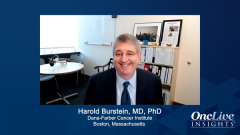
HR+/HER2- Breast Cancer: Excitement for Upcoming Clinical Trial Readouts
Key opinion leaders in breast cancer management share their excitement for data that will be released at the annual ASCO meeting in 2022 or the near future.
Episodes in this series

Transcript:
Harold Burstein, MD, PhD: Perhaps the most exciting thing for patients with ER [estrogen receptor]–positive metastatic breast cancer are antibody-drug conjugates being developed in other types of breast cancer and finding their way to ER+ breast cancer. In particular, there’s a drug called trastuzumab deruxtecan, which people are very excited about. This drug is FDA approved for the treatment of HER2 [human epidermal growth factor receptor 2]–positive breast cancer. It’s marketed as Enhertu, so people may know it by that name. There’s been a randomized study for standard chemotherapy vs trastuzumab deruxtecan in tumors that are HER2 low, by which we mean they are HER2 1+ or HER2 2+ [immunohistochemistry test]. The vast majority of those cancers are ER+ breast cancers that, by traditional criteria, are HER2-.
In the company press releases that we’ve seen so far and in data we saw at ASCO [American Society of Clinical Oncology Annual Meeting] in June, trastuzumab deruxtecan outperformed other standard chemotherapy options in second- and third-line treatment of ER+ metastatic breast cancer. The rumors are that it outperformed it substantially. It looks like there’s going to be a crossover of trastuzumab deruxtecan from HER2+ breast cancer into this larger subgroup of HER2 1+ or 2+ cancers, almost all of which are ER+ HER2 1+ or ER+ HER2 2+ tumors. It’s a really interesting development.
Another example of that is with sacituzumab govitecan, which is an anti-TROP2 antibody-drug conjugate. It’s FDA approved for triple-negative breast cancer and marketed as Trodelvy. That company has done a trial looking at their antibody-drug conjugate against standard chemotherapy and ER+ breast cancer, and it has released a press release indicating that the results are positive. We haven’t seen those data yet. We don’t know how positive it is. We don’t know how it would compare with the trastuzumab deruxtecan observation. But what’s interesting is that a drug developed for triple-negative disease and a drug developed for HER2+ disease are going to be converging on this space of ER+ HER2- breast cancer. That’s going to be good news for patients if it creates additional therapeutic opportunities.
Finally, we continue to make progress in early stage ER+ breast cancer. More and more, we’re optimizing our endocrine therapies. There are some data that show the use of CDK4/6 inhibitor abemaciclib might help prevent some recurrences in very high-risk, ER+, early stage breast cancer. The real hope is that in the long run there’s less recurrence of ER+ disease. For patients who are experiencing recurrence, we’re going to see a lot of new developments in the years to come built around these antibody-drug conjugates and other evolving treatments.
Massimo Cristofanilli, MD, FACS: ASCO was an opportunity to witness the presentation of the overall survival [OS] data for PALOMA-2. [This trial] is becoming mature, so it can be compared with others, which already reached a demonstration of overall survival benefit. We hope this study will be positive. The initial report, at least in the new release, seems to suggest that the study has reached the time point and has demonstrated 30% improvement at the interim efficacy analysis. This was 1 of the primary end points. The primary efficacy data of the study suggest…that this agent, sacituzumab, can be used in patient-exhausted androgen agent therapy, so they need chemotherapy treatment for their progressive disease.
Richard Finn, MD: In the coming years, [we’ll be speaking about]… overall survival data from PALOMA-2. These data have been a very long haul for me from the initial preclinical observation made with Dennis Slamon at UCLA [University of California, Los Angeles]. Preclinically, palbociclib and CDK inhibitors looked important in ER+ HER2- breast cancer to the proof of concept in PALOMA-1, which got accelerated approval for palbociclib, and PALOMA-2, the confirmatory study.
The other CDK story with ribociclib and abemaciclib and the final OS data from PALOMA-2 were presented [at ASCO]. This is a story that started well over a decade ago for me, so it’s very gratifying to have that data set. Also, we saw data from the MAINTAIN study, which looked at ribociclib and fulvestrant or exemestane for patients who had received a CDK inhibitor in the frontline setting. That’s a very important clinical question. We saw novel therapies in this space, specifically with sacituzumab in ER+ breast cancer, as well as data with HER2 antibody-drug conjugate in HER2-low breast cancer. All these studies have been eagerly awaited.
Transcript edited for clarity.







































